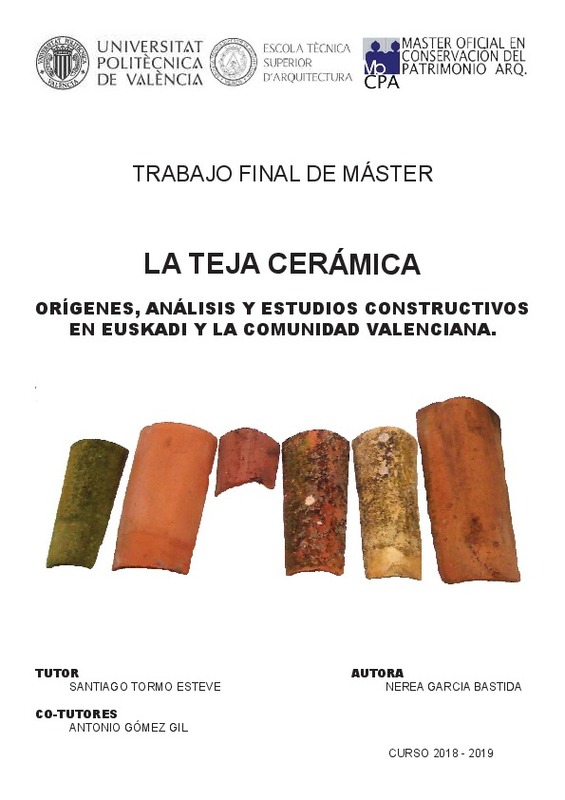JavaScript is disabled for your browser. Some features of this site may not work without it.
Buscar en RiuNet
Listar
Mi cuenta
Estadísticas
Ayuda RiuNet
Admin. UPV
La teja cerámica: orígenes, análisis y estudios constructivos en Euskadi y la Comunidad Valenciana
Mostrar el registro sencillo del ítem
Ficheros en el ítem
| dc.contributor.advisor | Tormo Esteve, Santiago
|
es_ES |
| dc.contributor.advisor | Gómez Gil, Antonio Miguel
|
es_ES |
| dc.contributor.advisor | Bastida Torróntegui, Ana Isabel
|
es_ES |
| dc.contributor.author | García Bastida, Nerea
|
es_ES |
| dc.date.accessioned | 2019-11-27T16:20:00Z | |
| dc.date.available | 2019-11-27T16:20:00Z | |
| dc.date.created | 2019-09-20 | |
| dc.date.issued | 2019-11-27 | es_ES |
| dc.identifier.uri | http://hdl.handle.net/10251/131914 | |
| dc.description.abstract | [ES] Llama la atención cómo, con sólo arcilla, agua y sol, se puede crear un elemento tan funcional, versátil, polifacético, rentable y humilde como la teja cerámica. Este elemento, a lo largo de la historia, ha sido tan extremadamente presente e importante como para formar parte del patrimonio por méritos propios. Sus orígenes se remontan, según registros antiguos, hacia el año 2000 a.c. en Mesopotamia alrededor de los ríos Tigris y Éufrates. Casi al mismo tiempo se registra también en China la fabricación de tejas esmaltadas. Su utilización, prácticamente a nivel mundial, ha llegado hasta nuestros días y todo indica que va a seguir utilizándose durante mucho tiempo. El presente trabajo final de máster, pretende analizar, mediante una labor de investigación, el elemento y su sistema constructivo , a nivel individual y en conjunto en dos zonas diferentes como son Euskadi y la Comunidad Valenciana. Los aspectos a estudiar se centran en el análisis compositivo, funcional, constructivo y social, dependiendo del clima, el terreno y la sociedad dónde se encuentre, lo que desemboca en un estudio comparado de la teja utilizada, el sistema de soporte y las lesiones que se puedan presentar según los factores de alteración presentes. Completa este estudio la realización de analisis experimentales para determinar las propiedades físicas, químicas y morfológicas del propio elemento. | es_ES |
| dc.description.abstract | [EN] It is striking how, with only clay, water and sun, you can create an element as functional, versatile, profitable and humble as ceramic tile. This element, throughout history, has been so extremely present and important as to be part of the patrimony by its own merits. Its origins date back, according to ancient records, to the year 2000 a.c. in Mesopotamia around the Tigris and Euphrates rivers. Almost at the same time, the manufacture of enameled tiles is also registered in China. Its use, practically worldwide, has reached our days and everything indicates that it will continue to be used for a long time. The present TFM project aims to analyze, through research, the element and its construction system, individually and together in two different areas such as Euskadi and the Valencian Community. The aspects to be studied focus on the compositional, functional, constructive and social analysis, depending on the climate, the terrain and the society where it is located, which leads to a comparative study of the tile used, the support system and the patologies that they can be presented according to the alteration factors present. This study completes the performance of experimental analyzes to determine the physical, chemical and morphological properties of the element itself. | es_ES |
| dc.format.extent | 122 | es_ES |
| dc.language | Español | es_ES |
| dc.publisher | Universitat Politècnica de València | es_ES |
| dc.rights | Reserva de todos los derechos | es_ES |
| dc.subject | Tejas | es_ES |
| dc.subject | Cerámica | es_ES |
| dc.subject | Cultura | es_ES |
| dc.subject | Arquitectura | es_ES |
| dc.subject | Patrimonio | es_ES |
| dc.subject | Construcción | es_ES |
| dc.subject | Tiles | es_ES |
| dc.subject | Ceramics | es_ES |
| dc.subject | Culture | es_ES |
| dc.subject | Architecture | es_ES |
| dc.subject | Heritage | es_ES |
| dc.subject | Construction | es_ES |
| dc.subject.classification | CONSTRUCCIONES ARQUITECTONICAS | es_ES |
| dc.subject.classification | COMPOSICION ARQUITECTONICA | es_ES |
| dc.subject.other | Máster Universitario en Conservación del Patrimonio Arquitectónico-Màster Universitari en Conservació del Patrimoni Arquitectònic | es_ES |
| dc.title | La teja cerámica: orígenes, análisis y estudios constructivos en Euskadi y la Comunidad Valenciana | es_ES |
| dc.type | Tesis de máster | es_ES |
| dc.rights.accessRights | Abierto | es_ES |
| dc.description.bibliographicCitation | García Bastida, N. (2019). La teja cerámica: orígenes, análisis y estudios constructivos en Euskadi y la Comunidad Valenciana. http://hdl.handle.net/10251/131914 | es_ES |
| dc.description.accrualMethod | TFGM | es_ES |
| dc.relation.pasarela | TFGM\100314 | es_ES |
Este ítem aparece en la(s) siguiente(s) colección(ones)
-
ETSA - Trabajos académicos [4687]
Escuela Técnica Superior de Arquitectura






